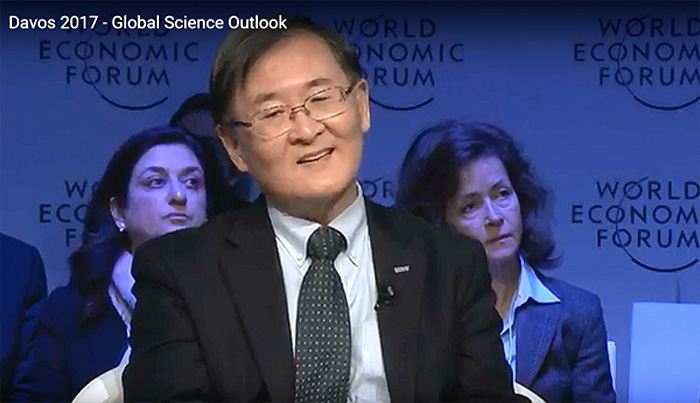people

President Sung-Mo Kang of KAIST participated in the World Economic Forum’s Annual Meeting January 17-20, 2017 in Davos, Switzerland.
On January 20, President Kang joined the Arena discussion on the outlook of global science in the year ahead with a group of distinguished scientists, including the Director of the US National Science Foundation, France A. Córdova, and the Editor-in-Chief of Nature, Philip Campbell.
Under Dr. Campbell’s moderation of the session, the panelists introduced their perspectives on 2017 and engaged in free discussions among themselves and with the audience.
President Kang began his talks on four major technological trends that have caught much of our attention in recent years, which he called “ICBM.” The “I” stands for the Internet of Things (IoT), “C” for cloud computing, “B” for brain, in other words, cognitive computer science such as artificial intelligence, and “M” for mobile technology that has been widely applied to unmanned ground vehicles and drones.
He noted the emergence of brain research as one of the most exciting fields in the coming years, and accordingly, we will learn more about its functions and develop promising results in treating brain-related diseases, i.e., a nanoscale memory chip being inserted into a patient suffering from dementia for targeted therapy.
President Kang also mentioned the role of higher education in the era of the Fourth Industrial Revolution, for example, how to foster scientists and engineers to responsibly meet with the challenges anticipated in today’s rapidly changing technological environments. He said that robots would replace many jobs, and it is important to come up with real solutions for such changes.
Lastly, President Kang stressed that the scientific community should continue its efforts to communicate with the public, accurately informing them of key scientific issues and offering opportunities to hold public discussions and debates that have greater influence over society. He presented a case of Korea’s latest outbreaks of Avian Influenza that resulted in destroying hundreds of thousands of infected chickens to prevent the spread of the disease, and highlighted the need for maintaining a strong communication channel between science and the public.
The full list of the participating panelists included Sung-Mo Steve Kang, President, KAIST; Marc N. Casper, President and Chief Executive Officer, Thermo Fisher Scientific, USA; France A. Córdova, Director of the National Science Foundation (NSF), USA; and Fabiola Gianotti, Director General of the European Organization for Nuclear Research (CERN), Geneva, Switzerland.
To watch the entire discussion, please go to https://www.youtube.com/watch?v=bF-joYnyYa0.
-
research KAIST Develops a Multifunctional Structural Battery Capable of Energy Storage and Load Support
Structural batteries are used in industries such as eco-friendly, energy-based automobiles, mobility, and aerospace, and they must simultaneously meet the requirements of high energy density for energy storage and high load-bearing capacity. Conventional structural battery technology has struggled to enhance both functions concurrently. However, KAIST researchers have succeeded in developing foundational technology to address this issue. < Photo 1. (From left) Professor Seong Su Kim, PhD
2024-11-27 -
event KAIST Office of Global Initiative Hosts 2024 Global Startup Internship Seminar
< Photo of ImpriMed CEO Sungwon Lim’s lecture > The Office of Global Initiative at KAIST successfully hosted the 2024 Global Startup Internship Seminar (GSIS) from Wednesday, November 20, to Friday, November 22. Now in its third year, following the 2022 Global Startup Internship Fair, the GSIS aims to introduce KAIST students to internship opportunities at U.S.-based startups and encourage participation in global internship programs, particularly for students with entrepreneu
2024-11-25 -
research KAIST Secures Core Technology for Ultra-High-Resolution Image Sensors
A joint research team from Korea and the United States has developed next-generation, high-resolution image sensor technology with higher power efficiency and a smaller size compared to existing sensors. Notably, they have secured foundational technology for ultra-high-resolution shortwave infrared (SWIR) image sensors, an area currently dominated by Sony, paving the way for future market entry. KAIST (represented by President Kwang Hyung Lee) announced on the 20th of November that a research t
2024-11-22 -
event KAIST’s RAIBO2 becomes the World’s First Robo-dog to Successfully Complete a Full-course Marathon
KAIST's quadrupedal walking robot "RAIBO", which can run seamlessly on sandy beaches, has now evolved into "RAIBO2"and achieved the groundbreaking milestone by becomeing the world's first quadrupedal robot to successfully complete a full-course marathon in an official event. < Photo 1. A group photo of RAIBO2 and the team after completing the full-course marathon > KAIST (President Kwang Hyung Lee) announced on the 17th of November that Professor Je Min Hwangbo's research team of t
2024-11-17 -
research KAIST Unveils New Possibilities for Treating Intractable Brain Tumors
< Photo 1. (From left) Professor Heung Kyu Lee, KAIST Department of Biological Sciences, and Dr. Keun Bon Ku > Immunotherapy, which enhances the immune system's T cell response to eliminate cancer cells, has emerged as a key approach in cancer treatment. However, in the case of glioblastoma, an aggressive and treatment-resistant brain tumor, numerous clinical trials have failed to confirm their efficacy. Korean researchers have recently analyzed the mechanisms that cause T cell exhaus
2024-11-15